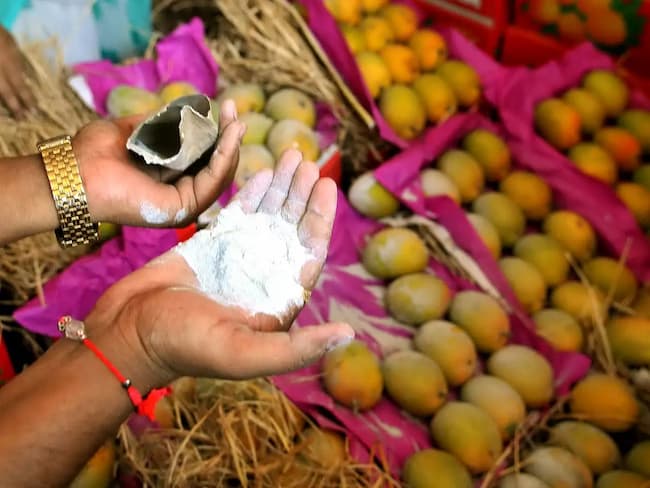Some people go through different means in order to ripen their fruits or the fruits they want to sell without caring about the side effects of the health of the consumers.
While some people will cover their fruits with clothes or keep them in a dark and warm environment, some will use Calcium Carbide.
Calcium carbide also known as Calcium Acetylide is a greyish-black lump or crystalline chemical substance with a garlic-like odour. It is used to generate acetylene gas, as a reducing agent, and is used in steel manufacturing and metal cutting.
Fruits are high in vitamins and minerals, and they help to avoid vitamin C and vitamin A deficits. People who eat fruits as part of a healthy diet are less likely to develop chronic diseases.
However, the use of artificial ripening chemicals or products cause a great damage and take away the benefits of the fruits.
Why You Should Not Ripen Your Fruits With Calcium Carbide
Calcium carbide can affect the neurological system by inducing prolonged hypoxia. It causes symptoms like headache, dizziness, high sleepiness, memory loss, cerebral oedema, numbness in the legs and hands, general weakness, cold and damp skin, low blood pressure and seizure.
Consuming such artificially ripened fruits could result in sleeping disorders, mouth ulcers, skin rashes, kidney problems and cancer.
The National Agency for Food and Drug Administration and Control (NAFDAC) has advised Nigerians to avoid eating fruits that have been ripened with calcium carbide.
Mojisola Adeyeye, the director-general of NAFDAC, issued the warning during her keynote lecture on Thursday in Uyo, Akwa Ibom, at a media sensitisation workshop on the hazards of drug hawking and fruit ripening with calcium carbide.
According to the director-general, NAFDAC has begun efforts around the country to eradicate the threat of using chemical substances to ripen fruits.
“Consumption of fruits containing these impurities may cause cancer, heart, kidney and liver failure.
“They may also cause frequent thirst, irritation in mouth and nose, weakness, permanent skin damage, difficulty in swallowing, vomiting, skin ulcer and so on.
“Higher exposure may cause undesired fluid build-up in lungs (pulmonary oedema).
“Acetylene produced by calcium carbide affects the neurological system and reduces oxygen supply to the brain and further induces prolonged hypoxia.
“The impurities are hazardous to pregnant women and children and may lead to headache, dizziness, mood disturbances, mental confusion, memory loss, cerebral oedema (swelling in the brain caused by excessive fluids), sleepiness, and seizure.”
How can you tell?
The artificially ripened fruit can be identified. Fruits such as tomato, mango, and papaya will have uniform skin color, and in the case of banana, the fruit will be yellow while the stem will be dark green. The fruits would also be blander and have a shorter shelf life.
Also, if the fruits are available before their season, they may have been artificially ripened. Washing and peeling fruits before eating can help to reduce the danger of calcium carbide. Standard laboratory analysis can also be performed to determine whether they are polluted.













